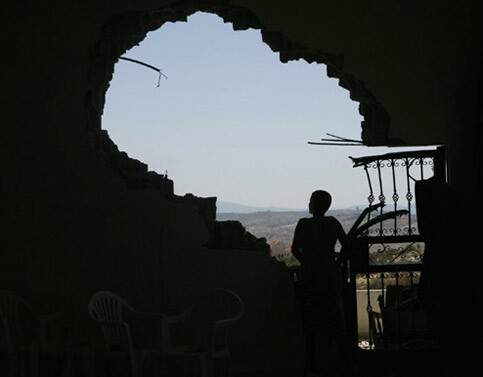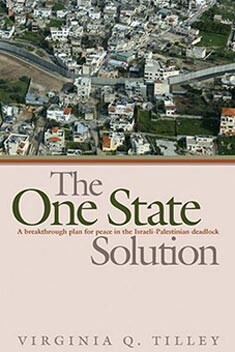South Africa 8 October 2006

A child looks out of a giant hole in the wall of his home in Beit Yahoun, southern Lebanon. (UNHCR/A. Branthwaite)
Less than a month after the guns fell silent - despite the ear-splitting roar of Israeli jet fighters regularly searing through Lebanese air space in violation of a UN brokered “ceasefire” - my recent trip to Beirut and the war-ravaged southern Lebanon, along with my colleague from Media Review Network, Dr Anver Suliman, brought home the brutal reality of Israeli savagery.
In scores of places where we stood knee-high deep in debris and rubble of towns and villages, the signs of life are steadily becoming more and more visible. Noises emanating from the engines of front-end loaders, tipper trucks and bulldozers clearly signal the intent of the million plus displaced Lebanese not to allow Israel to succeed in turning their homes in picturesque southern landscape into no-go “ghost” areas.
Evident in the carnage and devastation caused by relentless round-the clock bombings by the Israeli navy, air force and military, is an unmistakable determination by the Olmert regime to erase Hezbollah’s national identity from Lebanese soil.
That such policies flowing out of a mindset keen to unleash ethnic cleansing have failed previously seems not to have washed with the apartheid state of Israel, who foolishly repeats such useless tactics.
These moribund plans which reflect a stubborn refusal to learn lessons from history have been adopted by successive Israeli leaders to bomb the Palestinians out of existence. The parallels between Olmert’s apartheid-style kragdadigheid (brutal force) towards Hezbollah and Hamas today and those of his comatose predecessor Ariel Sharon are no different.
The tragic results of such insolvent policies, devoid of morals and principles, were brought home to us in the ruins of Qana.
If there is one single place anyone keen to understand the constant refrain contained within troubling questions such as: “Why do they hate us?”, it is Qana.
Here too one will find why the waging of wars in Gaza and Lebanon by America’s surrogate state will never succeed in winning the “hearts and minds” of its innocent victims.
Not surprising then that a growing number of US academics, political analysts and journalists are calling for an urgent review of the Bush administration’s unconditional support of the Jewish state.
Former US Congressman Paul Findley called for America to end its “dangerous attachment” to Israel. He made his call for a clean break by citing the awesome tragedy at Qana.
“The ghastly human carnage at Qana, Lebanon, should awaken everyone to the grim reality that our nation’s attachment to Israel is bad news.”
Findley goes onto claim that this link allows Israel to entangle America in one awful mess after another: “First 9/11, then Afghanistan, then Iraq, and now Lebanon. None would have occurred if our government had refused to support Israel’s long subjugation of the Palestinians.”
As we stood at the Qana burial site amongst the graves of the Hashimi and Shalhoub familie -s- who lost over 20 family members between them - one realizes why the compelling arguments made by various advocates of sanctions against Israel, cannot be faulted.
The list of atrocities goes on beyond Qana.
Siddiqin, Hanawai, Kafra, Beitlief, Aytulshab, Bint Jubail, Meisul Jabal, Mohairib, Adaist, Fatima Gate, Khiam.
Each town and village has a story to tell. Each story reveals the senselessness of Israeli madness. This madness is manifest in the mindless destruction of homes, schools, mosques, hospitals, roads, bridges and vital resources such as water and electricity facilities.
What do you attribute such savagery to?
Indeed, residents who saw their precious belongings - accumulated over decades - smashed to oblivion, ask this fundamental question, over and over! They wonder too whether the international community has any conscience.
Why does Israel remain unaccountable despite perpetrating the most horrendous crimes against humanity?
These questions are validated by constant references to the continued occupation of the Golan Heights, Sheba Farms and of course Palestine.
And as South Africans we wonder too why our country retains cosy relations with Israel, despite knowing that the Jewish state is carved out of stolen land and thrives on state terrorism unparalleled in modern history?
Equally, it makes little sense why countries like America and Britain together with pro-Israeli lobbies in Washington, London and Johannesburg support and facilitate the Olmert regime’s malicious war of destruction.
The wanton destruction inherent in Israel’s war with Hezbollah is evident in the outrageous fact that in the last three to four days it scattered at least 350,000 unexploded cluster bombs in south Lebanon.
This deadly legacy for Lebanese civilians which a UN official, Chris Clark, described as “extensive and, in my opinion, unprecedented” defines a range of new battles awaiting Lebanon.
Our meetings with senior Hezbollah leaders, including MPs Dr Haj Hassan Hoossein and Mohammed Haider, assured us that the victory attained by the resistance, which is correctly viewed as a turning point in the six decade long Israeli/Palestinian conflict, will be used as a stepping stone to sustain Lebanon’s determination to built itself from the ashes of bombed ruins.
Iqbal Jassat is chairman of the Media Review Network, an advocacy group based in South Africa.
Related Links





